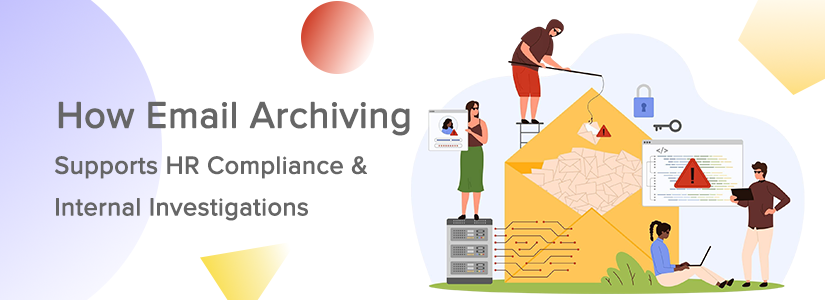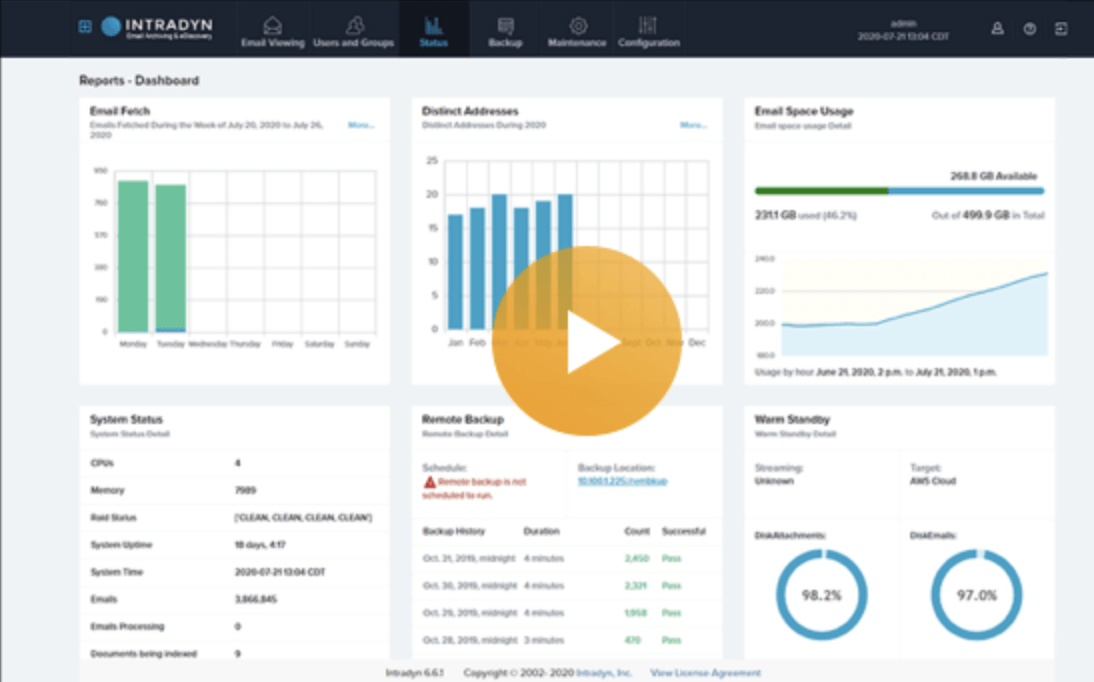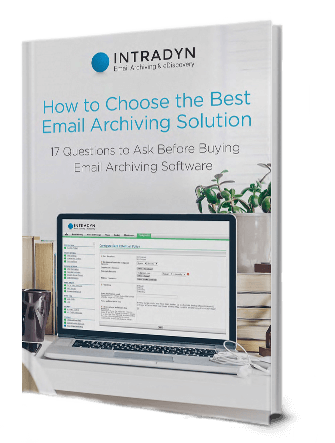How Email Archiving Supports Internal Investigations & HR Compliance

Introduction
In today’s workplace, email is more than communication — it’s a record of decisions, employee interactions, and potential legal or HR actions. For HR professionals and legal teams, having access to reliable email archives is essential. Whether they’re handling internal investigations, responding to audits, or meeting regulatory requirements, email archiving plays a vital role. It helps organizations stay accountable, transparent, and protected from risk.
Key topics covered in this blog:
- What is Email Archiving
- Why email archiving is essential for HR investigations and compliance
- How archives provide evidence and support legal defensibility
- Key features include legal holds, audit trails, and role-based access
- The basics of how modern email archiving systems work
- How AI and analytics improve search, detection, and risk prevention
Email Archiving Overview
Email archiving is an automated process that securely captures, stores, and indexes all inbound and outbound email communications, allowing them to be easily searched and retrieved when needed. Attachments and metadata are integral parts of this process. Rather than backing up data, archiving ensures emails are preserved in a tamper-proof, centralized repository that meets regulatory and compliance requirements.
Modern email archiving solutions emphasize critical features such as:
- Encryption
- Configurable
- Retention policies
- Compliance enforcement.
By offloading email data from primary mail servers, these systems enhance performance for both storage and search, ensuring that deleted emails remain accessible. As a result, email archiving has become a crucial tool for organizations focused on preserving data integrity, enabling legal discovery, and enhancing workflow efficiency.
Why Email Archiving is Critical for HR and Investigations
Email archiving goes beyond basic storage requirements or regulatory compliance; it supports crucial business functions such as:
1. A Definitive Record for Investigations
When employee misconduct surfaces—whether allegations of harassment, discrimination, or fraud—access to a comprehensive, untampered archive of communications is essential. Email archives preserve the chain of custody and provide an unaltered record of details of all communications, including sender, recipient, and timing
2. Evidence for Legal and HR Defensibility
HR decisions, including terminations or disciplinary actions, must be backed by clear, documented context. Email records supply that evidence. A robust archive ensures your organization can produce timely, defensible records to meet internal and external scrutiny.
3. Audit Trails and Policy Enforcement
In HR audits, regulators often request communication logs. A well-maintained archive provides traceable data that demonstrates adherence to company policy and legal obligations.
4. Dispute Resolution Made Efficient
Whether it’s responding to EEOC (US Equal Employment Opportunity Commission) inquiries or mitigating litigation risks, searchable archives enable HR to retrieve communications within minutes rather than days, significantly accelerating the process and reducing associated costs.
Together, these functions make email archiving an indispensable tool for HR, ensuring transparency, accountability, and speed when navigating sensitive issues. Without it, investigations can stall, legal exposure increases, and valuable time is lost to manual data retrieval. A comprehensive, tamper-proof archive supports defensible decision-making while strengthening organizational trust, providing the foundation to explore how email archiving directly drives and enhances HR investigations.
How Email Archiving Drives HR Investigations
Email archiving plays a pivotal role in streamlining HR investigations by delivering fast, secure, and compliant access to critical communications. With modern tools, HR teams can move from reactive to proactive investigation strategies, ensuring issues are handled thoroughly and efficiently.
Some examples include:
Instant Search & Contextual Analytics
- Modern archiving systems provide full-text search capabilities across dates, participants, attachments, and keywords. Additionally, many vendors incorporate analytics and tagging features, enabling HR to identify communications pertinent to specific incidents efficiently
Preservation Through Legal Holds
- When an investigation begins, a targeted legal hold is placed on relevant emails, preventing deletion while the inquiry unfolds. This capability is crucial for compliance with internal policies and external regulations.
Chain-of-Custody Integrity
- A comprehensive audit trail—documenting who accessed specific emails and when—ensures the integrity of any resulting reports and legal proceedings. Email archiving systems are inherently designed to provide this level of traceability.
Granular, Role-Based Access
- Instead of granting broad access to IT or managers, HR and compliance officers receive just the permissions they need, enabling them to investigate without violating user privacy or IT policy.
Together, these features create a secure investigative framework that not only protects sensitive data but also reinforces trust in HR processes. This ensures that every investigation is conducted more quickly, accurately, and with complete auditability.
Compliance & Legal Requirements for HR Email Archiving
As HR departments navigate a growing web of legal obligations, compliant email archiving has become a foundational element of risk management and employee data governance. To meet these regulatory requirements, organizations implement:
1. Regulatory Retention Rules
Organizations are required to store and manage email communications securely under various regulatory mandates. Key examples include:
- Department of Labor protections under Title VII – requiring documentation of employment disputes
- GDPR and CCPA – regulate storage and access to personal employee data
- Financial regulations (FINRA, SEC) – require preservation of all business correspondence for several years
2. Security and Data Protection
To comply with these mandates, archiving solutions must enforce:
- Tamper-proof, WORM-capable (Write Once Read Many) storage to prevent data manipulation
- Encryption both in transit and at rest to ensure data safety
- Comprehensive audit logs to track all data access and policy changes
These security measures are critical for maintaining compliance and protecting organizational integrity. The protocols additionally enable the transparency and accountability needed to support legal defenses and internal audits.
The Strategic Value of Email Archiving for HR and Internal Investigations
- Faster, more efficient investigations
Automated search and legal-hold capabilities that surface evidence in minutes. - Stronger defense against litigation
Clear, dated communications backed by chain-of-custody make HR decisions less vulnerable. - Proactive risk management
With analytic tools, HR can catch issues before they escalate, leading to a more constructive workplace culture. - Simplified compliance
Defined retention policies, defensible storage, and secure access satisfy regulatory demands. - Enhanced data governance
By consolidating communications, archiving helps HR gain visibility into behavior trends and systemic risk areas.
These benefits position email archiving as far more than a technical solution; it’s a strategic asset that empowers HR to act with speed, confidence, and accountability. By aligning archiving practices with broader business goals, organizations can build a more transparent, compliant, and resilient workplace.
The Impact of AI & Analytics in Email Archiving
Artificial Intelligence (AI) is redefining email archiving and information governance, not just as a tool for storing messages, but as a strategic asset for compliance, security, and workforce management.
Legacy archiving systems were designed primarily for static storage and basic retrieval. While useful in their time, they often lacked the flexibility, speed, and intelligence needed to support today’s dynamic regulatory and workplace environments.
Modern platforms leverage AI and automation to provide real-time analysis, smarter classification, and reduce manual effort. This evolution empowers HR and compliance teams with intelligent analytics that proactively identify risks and speed up investigations. Unlike traditional one-size-fits-all solutions, AI-driven systems continuously adapt to meet evolving workplace and regulatory demands.
Here’s how AI is transforming the email archiving landscape:
- Auto-Tagging and Classification: Natural Language Processing (NLP) categorizes emails by topic, urgency, or policy relevance, automating manual tasks and helping HR quickly focus on high-priority communications.
- Sentiment Analysis: Algorithms detect emotionally charged or hostile language, enabling HR to identify potential issues early and intervene before they escalate.
- Entity Recognition and Pattern Detection: AI scans messages to find names, dates, or unusual communication patterns that may indicate policy violations, revealing hidden trends or risks.
- Anomaly Detection: Identify unusual behaviors, such as unexpected interactions between senior staff and external vendors, to provide early warnings for HR and compliance teams.
Summary of Key Points
- Email as a Critical Record: Email serves not only as a means of communication but also as a documented record of business decisions, employee interactions, and legal or HR actions.
- Essential for HR and Legal: Reliable email archiving supports internal investigations, audits, and regulatory compliance, helping organizations stay accountable and protected.
- How Email Archiving Works: Automated systems securely capture, store, and index emails, including attachments and metadata, in tamper-proof repositories with encryption and retention policies.
- Supporting HR Investigations: Archives provide definitive, unaltered records, preserving the chain of custody essential for misconduct investigations and legal defensibility.
- Audit Trails & Role-Based Access: Archiving solutions create comprehensive audit logs and allow granular, role-based permissions, balancing investigation needs with privacy concerns.
- Compliance with Regulations: Organizations must follow mandates like Title VII, GDPR, CCPA, FINRA, and SEC rules, requiring secure storage, tamper-proofing, encryption, and audit tracking.
- AI & Analytics Integration: Modern platforms use AI for auto-tagging, sentiment analysis, entity recognition, and anomaly detection to speed investigations and proactively mitigate risks.
- Strategic Value: Email archiving is more than storage; it empowers HR and legal teams to investigate efficiently, enforce policies, and improve organizational compliance with intelligent, secure, and integrated solutions.
Frequently Asked Questions (FAQ)
Can HR legally review employee email archives?
Yes, especially if communications occur over company-owned systems. Policies must be clear, communicated, and compliant with local privacy laws.
Is it ethical for HR to archive private messages?
When done under transparent policies and legal compliance, archiving protects employees and the company alike by preventing wrongdoing and ensuring fairness.
How long should HR data be retained?
Anywhere from 3 to 7 years, depending on regulations (e.g., EEOC, HIPAA, FINRA). Consult legal counsel to create tailored timelines.
Can AI reduce HR investigation time?
Yes, AI-driven search, tagging, and alerting often reduce manual review from days to hours, allowing teams to focus on remediation rather than data wrangling.
How can email archiving help improve overall workplace culture?
By enabling faster, more transparent investigations and proactive risk detection, email archiving supports a fairer, safer work environment where issues are addressed early and policies are consistently enforced.


